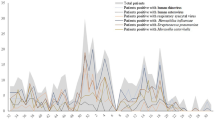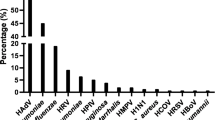Abstract
Respiratory syncytial virus (RSV) is well known for causing a potentially severe course of bronchiolitis in infants. Many paediatric healthcare workers claim to be able to diagnose RSV based on cough sound, which was evaluated in this study. Parents of children < 1 year old admitted to the paediatric ward because of airway complaints were asked to record cough sounds of their child. In all children, MLPA analysis—a variation of PCR analysis—on nasopharyngeal swab was performed (golden standard). Sixteen cough fragments representing 4 different viral pathogens were selected and presented to paediatric healthcare workers. Thirty-two paediatric nurses, 16 residents and 16 senior staff members were asked to classify the audio files and state whether the cough was due to RSV infection or not. Senior staff, nurses and residents correctly identified RSV with a sensitivity of 76.2%, 73.1% and 51.3% respectively. Correct exclusion of RSV cases was performed with a specificity of 60.8%, 60.2% and 65.3% respectively. Sensitivity ranged from 0 to 100% between colleagues; no one correctly identified all negatives. Residents had significantly lower rates of sensitivity than senior staff and nurses. This was strongly related to work experience, in which more than 3.5 years of work experience was related to the best result.
Conclusion: Senior staff and nurses were better in making a cough-based diagnosis of RSV compared to residents. Both groups were able to detect the same proportion of true RSV patients based on cough sounds compared to bedside tests but could not validly distinguish RSV from other pathogens based on cough sounds.
What is Known: • Many paediatric healthcare workers claim to be capable of diagnosing RSV in infants based on cough sound • Up to now, no studies investigating the recognisability of RSV based on cough sound are published | |
What is New: • Senior staff and paediatric nurses performed better than various other bedside tests in diagnosing RSV but could not replace MLPA analysis • Residents need at least 3.5 years of work experience to be able to make a RSV diagnosis based on cough sound |

Similar content being viewed by others
Abbreviations
- MLPA:
-
Multiplex ligation-dependent probe amplification
- PCR:
-
Polymerase chain reaction
- RSV:
-
Respiratory syncytial virus
References
Shi T, McAllister DA, O’Brien KL et al (2017) Global, regional, and national disease burden estimates of acute lower respiratory infections due to respiratory syncytial virus in young children in 2015: a systematic review and modelling study. Lancet 390:946–958. https://doi.org/10.1016/S0140-6736(17)30938-8
Reeves RM, Hardelid P, Gilbert R, Warburton F, Ellis J, Pebody RG (2017) Estimating the burden of respiratory syncytial virus (RSV) on respiratory hospital admissions in children less than five years of age in England, 2007-2012. Influenza Other Respir Viruses 11:122–129. https://doi.org/10.1111/irv.12443
Ghazaly M, Nadel S (2018) Characteristics of children admitted to intensive care with acute bronchiolitis. Eur J Pediatr 177:913–920. https://doi.org/10.1007/s00431-018-3138
Fauroux B, Simões EAF, Checchia PA, Paes B, Figueras-Aloy J, Manzoni P, Bont L, Carbonell-Estrany X (2017) The burden and long-term respiratory morbidity associated with respiratory syncytial virus infection in early childhood. Infect Dis Ther 6:173–197. https://doi.org/10.1007/s40121-017-0151-4
Florin TA, Plint AC, Zorc JJ (2017) Viral bronchiolitis. Lancet 389(10065):211–224. https://doi.org/10.1016/S0140-6736(16)30951-5
Rivera-Sepulveda AV, Rebmann T, Gerard J, Charney RL (2019) Physician compliance with bronchiolitis guidelines in pediatric emergency departments. Clin Pediatr 58(9):1008–1018. https://doi.org/10.1177/0009922819850462
Clark BW, Derakhshan A, Desai SV (2018) Diagnostic errors and the bedside clinical examination. Med Clin N Am 102:453–464. https://doi.org/10.1016/j.mcna.2017.12.007
Jacobsen AP, Chun Khiew Y, Murphy SP, Lane CM, Garibaldi BT (2020) The modern physical exam – a transatlantic perspective from the resident level. Teach Learn Med ISSN: 1040-1334 (Print) 1532-8015 (Online). https://doi.org/10.1080/10401334.2020.1724792
Garibaldi BT, Zaman J, Artandi MK, Elder AT, Russell SW (2019) Reinvigorating the clinical examination for the 21st century. Pol Arch Intern Med 129(12):907–912. https://doi.org/10.20452/pamw.15073
Bruning AHL, Leeflang MMG, Vos JMBW, Spijker R, de Jong MD, Wolthers KC, Pajkrt D (2017) Rapid tests for influenza, respiratory syncytial virus, and other respiratory viruses: a systematic review and meta-analysis. Clin Infect Dis 65(6):1026–1032. https://doi.org/10.1093/cid/cix461
Zuurbier RP, Bont LJ, Langedijk AC et al (2020) Low sensitivity of BinaxNOW RSV in infants. J Infect Dis:jiaa050. https://doi.org/10.1093/infdis/jiaa050
Norman G (2005) Research in clinical reasoning: past history and current trends. Med Educ 39(4):418–427. https://doi.org/10.1111/j.1365-2929.2005.02127.x
Ericsson KA (2007) An expert-performance perspective of research on medical expertise: the study of clinical performance. Med Educ 41(12):1124–1130. https://doi.org/10.1111/j.1365-2923.2007.02946.x
Weaver SJ, Newman-Toker DE, Rosen MA (2012) Reducing cognitive skill decay and diagnostic error: theory-based practices for continuing education in health care. J Contin Educ Heal Prof 32(4):269–278. https://doi.org/10.1002/chp.21155
Choudhry NK, Fletcher RH, Soumerai SB (2005) Systematic review: the relationship between clinical experience and quality of health care. Ann Intern Med 142(4):260–273. https://doi.org/10.7326/0003-4819-142-4-200502150-00008
Donnelly D, Everard ML (2019) ‘Dry’ and ‘wet’ cough: how reliable is parental reporting? BMJ Open Respir Res 6(1):e000375. https://doi.org/10.1136/bmjresp-2018-000375
Turner RD, Bothamley GH (2014) How to count coughs? Counting by ear, the effect of visual data and the evaluation of an automated cough monitor. Respir Med 108(12):1808–1815. https://doi.org/10.1016/j.rmed.2014.10.003
Acknowledgements
We would like to thank all infants, parents and caregivers. Furthermore, we would like to express our appreciation to the nurses, residents and senior staff that enthusiastically completed the research questionnaire. Finally, our special thanks to Dr. Charles Stewart for editing the final draft of this article.
Author information
Authors and Affiliations
Contributions
MvH was initiator of this study. All the authors participated in designing the study. MB and MvH were responsible for the clinical implementation, data collection and development of the cough questionnaire. KvS performed all statistical analyses. MB composed the first draft of the article and LdB, KvS and MvH significantly contributed to revising this content. All the authors read and approved the final manuscript.
Corresponding author
Ethics declarations
Conflict of interest
The authors declare that they have no conflict of interest.
Ethical approval
All procedures performed in studies involving human participants were in accordance with the standards of the institutional research committee (Spaarne Gasthuis) and with the 1964 Helsinki declaration and its later amendments or comparable ethical standards.
Informed consent
Informed consent from parents or caregivers of all participants included in the study was obtained.
Additional information
Communicated by Piet Leroy
Publisher’s note
Springer Nature remains neutral with regard to jurisdictional claims in published maps and institutional affiliations.
Rights and permissions
About this article
Cite this article
Binnekamp, M., van Stralen, K.J., den Boer, L. et al. Typical RSV cough: myth or reality? A diagnostic accuracy study. Eur J Pediatr 180, 57–62 (2021). https://doi.org/10.1007/s00431-020-03709-1
Received:
Revised:
Accepted:
Published:
Issue Date:
DOI: https://doi.org/10.1007/s00431-020-03709-1




